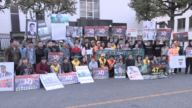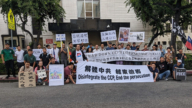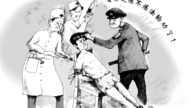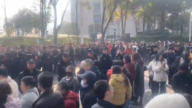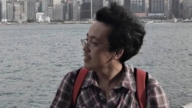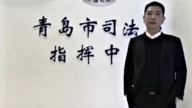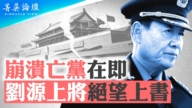【新唐人2013年03月23日讯】浙江杭州律师王成,向中国最高法院提起诉状,起诉人大委员长和人大副委员长的选举“违宪、无效”。王成还要求,重新举行选举。他的起诉材料已经在本周一寄出,最高法院19号签收了他的起诉,7天内,高院应做出是否受理的决定。目前,他在等待最高法院的回应。
王成对《新唐人》表示,提出这起诉讼案的理由是,按照中国现行的宪法规定,全国人大常委会的组成人员,不能同时担任行政机关、审判机关和检察机关的职务。
而人大在3月14号选出张德江为人大委员长,他当时仍然担任国务院副总理﹔一同当选的五位全国人大副委员长,当时也都担任行政机关和审判机关的职务:王胜俊是最高法院院长,张平是国家发改委主任,陈竺是卫生部长,万鄂湘是高法副院长,王晨是国务院新闻办主任。
王成:“中国宪法中规定,像国务院,中央军委,两高的负责人的任期,他说跟本届人大的任期相同。这里有一个问题,他可能会出现,当新一届人大开会的时候,原来所有的人他的任期可能就到了。但是开会要开十几天,到后面十几天的时候才产生新的负责人,这意味着这中间有十几天相关机构是没有人负责的,这里面可能会形成权力真空期。”
虽然全国人大做了补漏工作,张德江、王胜俊、张平、陈竺和万鄂湘在当选之后几天内,分别辞去了原来的职务。但王成表示,“人大”作为国家最高的立法机构,出现这种“违宪”现象,令人不能容忍。他作为一个公民和律师,有义务站出来维护宪法尊严。
王成:“第二个,我个人希望推动中国宪法司法化的进程。让更多法院判决得到体现建设一个真正的宪政法治国家。第三个,我是希望能引起整个社会的重视和讨论,能够提升宪法在国家中的地位。”
王成希望推动修改宪法,完善宪法。他认为,在中国,因为《宪法》从未在公民维权的司法实践中得到充分应用,大多时候《宪法》只是停留在纸面上,是一只起着装饰效果的“花瓶”而已。他作为一名律师,愿意去推动国家完善制度、法制,而政治权利也是公民其他权利的保障。
王成表示,这些年来,他也参与或发起很多公民权利运动,因此工作上受到很大压力。
王成:“因为这些年我也参与或发起过一些活动,比如不买房运动,还有千万公民大联署废除劳教活动,另外,我也组织过人大选举律师观察团,我自己也起诉过选举委员会,我自己也参加过人大代表独立选举,我也向财政部申请过财政信息公开。后来我也起诉了国务院。我两次起诉国务院,现在都没有得到答复。”
2011年9月,王成跟原来的律师事务所合同到期,对方不予续签。隔年2月,他与另一家事务所签了合同,但是后来新签约的事务所,也因为承受当局给予的压力,违反合同,没有让王成去上班。
王成试图申请开设自己的律师事务所,又因为种种原因,手续办不下来。
王成表示,他在网上公开他的起诉内容之后,他的两个微博账号已经被删除。
他还表示,在现实生活中,一些官员或明或暗的限制或剥夺公民的政治权利。而政治权利是基础性的问题,很多公民的权利需要国家机关来保障,如果公民对国家机关没有监督、制衡,相应的,自己的权利也不能得到保护。
王成认为,最高的维权就是政治维权。
采访编辑/秦雪 后制/周天
Chinese Lawyer Suing NPC’ Election of Heads
Wang Cheng, a lawyer from Hangzhou, Zhejiang Province,
has filed a lawsuit to China’s Supreme Court,
calling the heads’ election by National People’s Congress
(NPC) “unconstitutional” and “invalid.”
Wang has also requested a reelection to be held.
His claim was received by the Supreme Court on Mar 19.
The court will make a decision on whether to accept
the case in seven days.
Currently Wang is still waiting for the response
from the Supreme Court.
Wang Cheng told NTD that he filed the lawsuit
according to China’s current Constitution.
The latter requires the NPC’ standing committee members
to not hold office in any administrative, judicial, or procuratorial institution.
However, Zhang Dejiang served as a vice premier,
when elected as NPC’ standing committee chairman.
Plus, five other NPC’ standing committee vice-chairmen,
now elected as well, are in a similar situation.
Wang Shengjun was chief justice of the Supreme Court;
Zhang Ping was director of the National Development and Reform Commission;
Chen Zhu was health minister;
Wan Exiang was vice president of the Supreme Court;
Wang Chen was director
of the State Council Information Office.
Wang Cheng: ”According to China’s Constitution, for heads
of the State Council, the Central Military Commission,
the Supreme Court, and the Supreme Procuratorate,
their terms in office should agree with that of the NPC.
This creates a problem here. When new NPC session starts,
those former officials should leave their posts immediately.
However, their successors will not be designated
until over a dozen days later.
Thus no one is managing those institutions in the time gap
and there may be a power vacuum in between.”
The NPC has made remedy moves afterwards.
Zhang Dejiang, Wang Shengjun, Zhang Ping, Chen Zhu,
and Wan Exiang had resigned from their former positions, days after being elected by the NPC.
However, Wang Cheng remarked that it is unacceptable
for the NPC to violate the Constitution as China’s supreme legislative body.
As Chinese citizen and a lawyer, Wang said he has a duty
to stand up and protect the authority of the Constitution.
Wang Cheng: ”Besides, I personally expect to push forward
China’s constitutional judicature by doing this.
I hope our nation can become a real constitutional state
where the court decisions play more important roles.
In addition, I also want to call for attention and discussion
from the whole Chinese society.
This will help promote
China’s Constitution status.”
The lawyer is also expecting
improvements of China’s Constitution.
Wang remarked, the Constitution was never implemented
to the full in juridical practices of protecting citizens’ rights.
Most of the time China’s Constitution is only an “ornament”
for good look rather than using it in real practices.
As a lawyer, Wang said he was willing to promote changes
to China’s legal system, as any civil rights are safeguarded by their political rights.
Wang also spoke about how he had been involved in many
civil rights activities these years, which had brought a lot of pressure to his career.
Wang Cheng: ”These years I have started or took part
in many activities, like “Refuse to Buy House Movement,” and the joint effort to abolish the labor camps’ system.
I set up a lawyers monitoring group for the NPC’s election,
sued its electoral commission, and attended the election as independent delegate candidate myself.
I also requested that the Finance Department
makes the financial information public.
Lately, I also sued the State Council.
I sued them twice and received no response.”
In September, 2011, Wang Cheng’s contract with his former
law firm expired and he was refused a contract renewal.
In February, 2012, he signed up
with another law firm.
However, that firm failed to honor the contract,
being under pressure from the authorities.
After that Wang Cheng tried to open his own law firm,
but could not get a license for that.
Wang Cheng revealed that his two microblog accounts
were deleted after he published there about his lawsuit.
He further remarked that in reality some officials deprive
citizens of their political rights, either publicly or secretly.
However, the political right is a very fundamental issue,
and it needs to be protected by the national institutions.
If the citizens have no supervision over those organs,
and fail to build a “check and balance” system, accordingly their rights will not be protected.
Wang Cheng believes that the highest level of protecting
civil rights is to protect citizens’ political rights.


